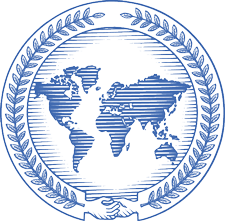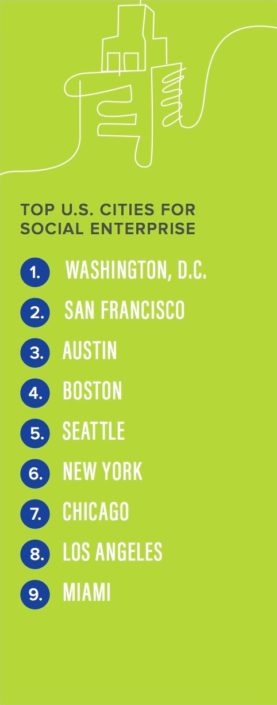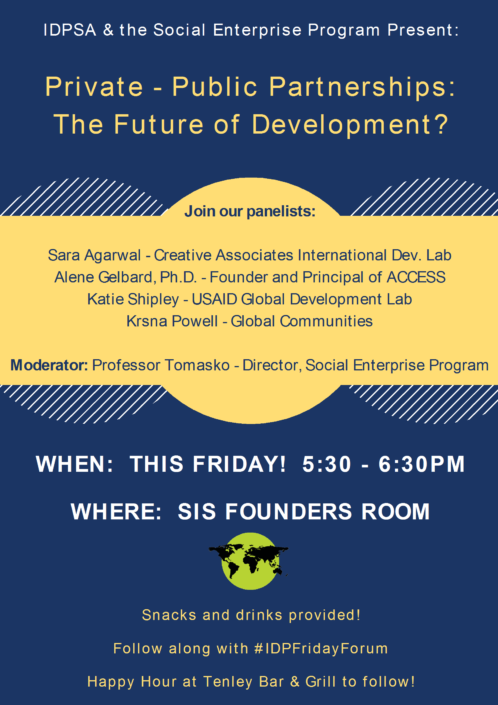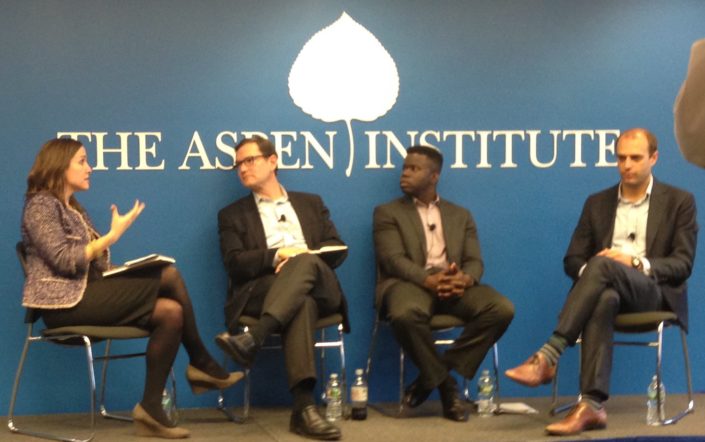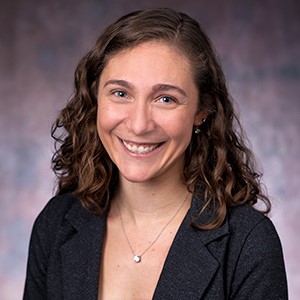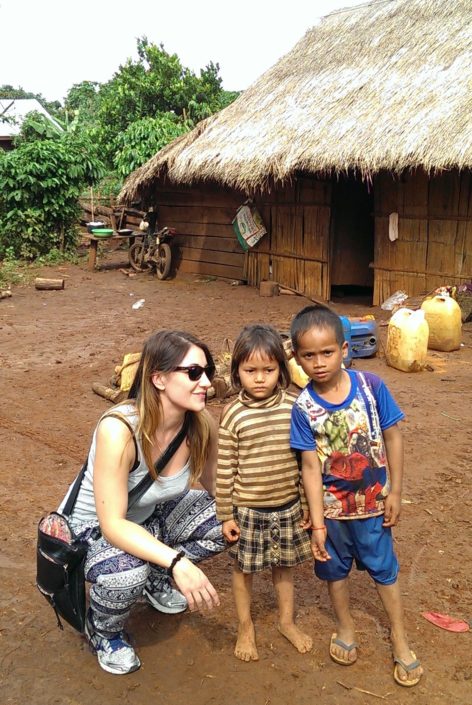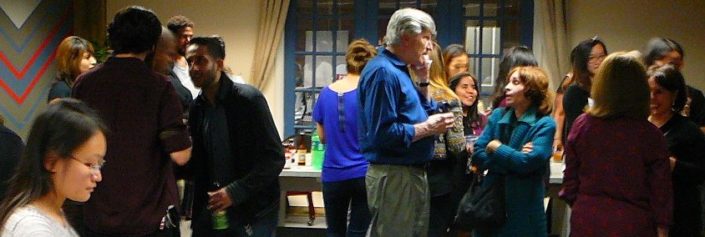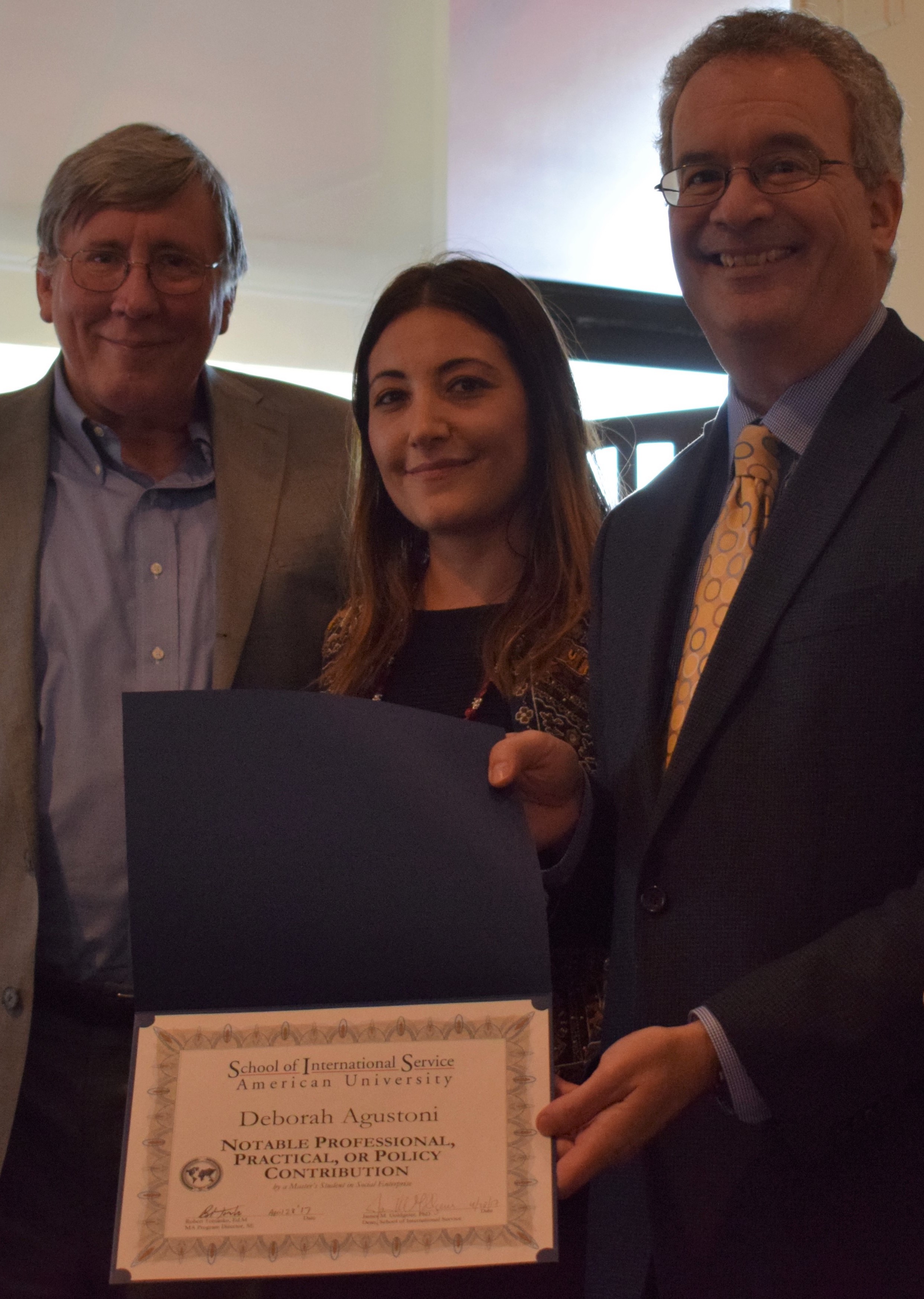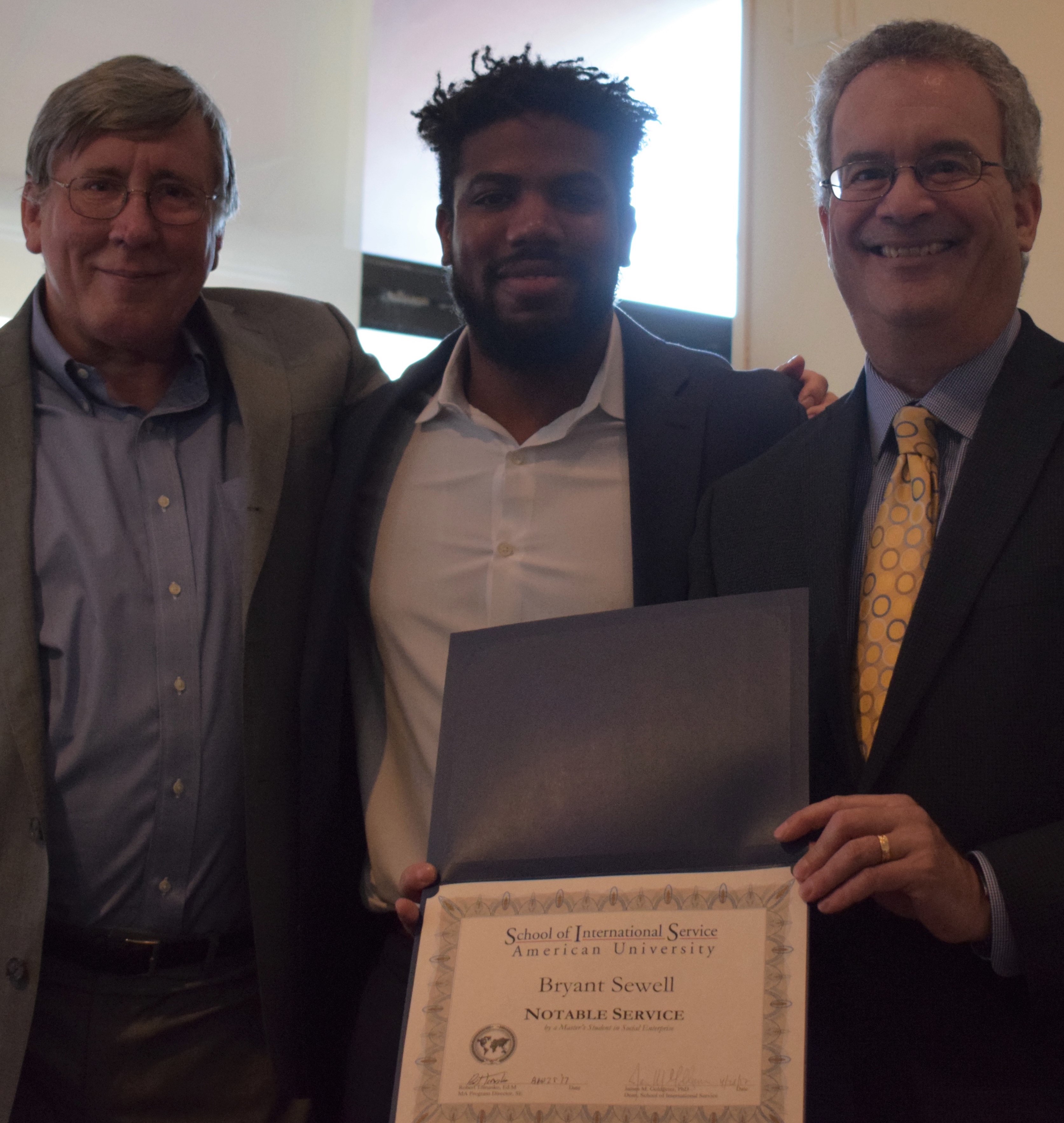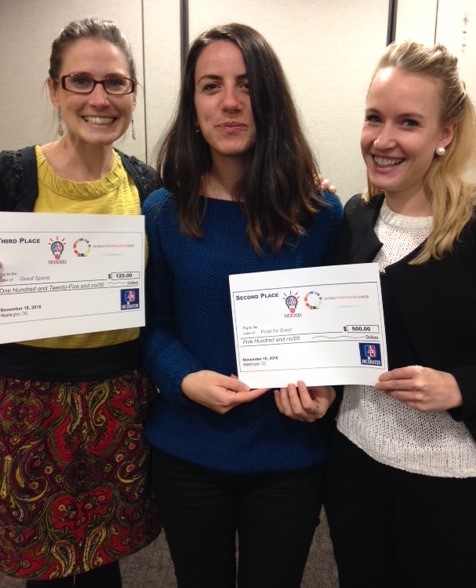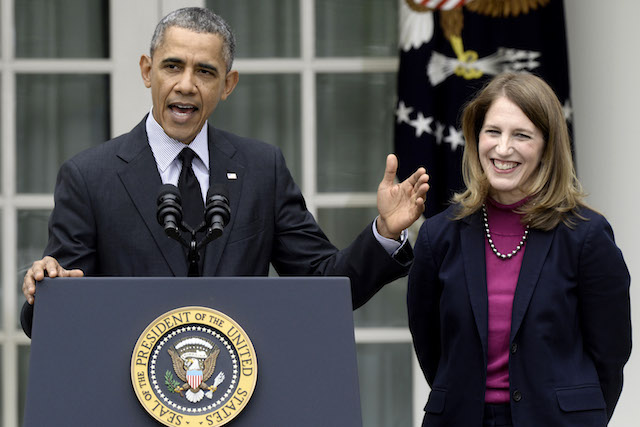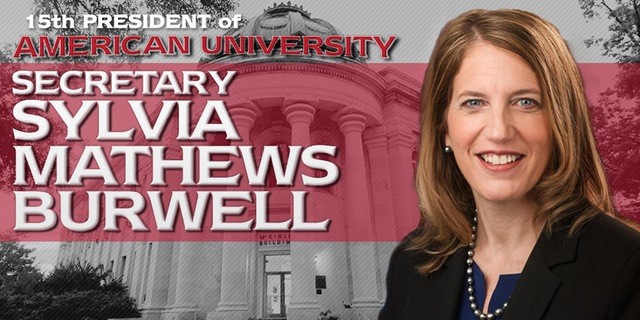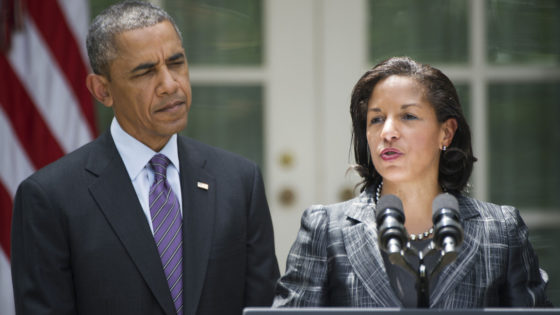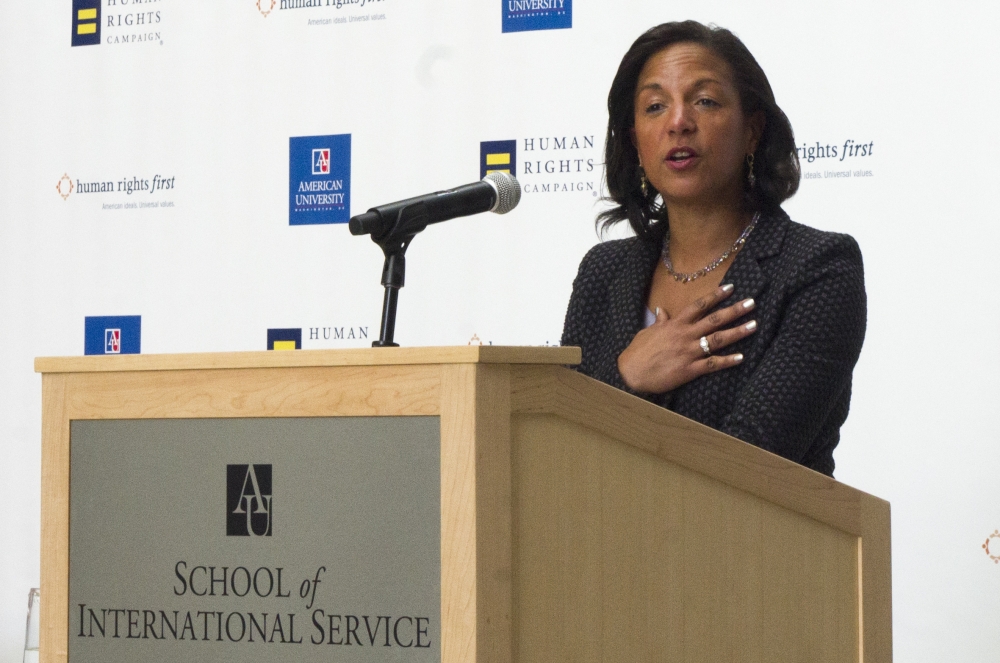
Can the Fashion Industry Change the World?
Two alumnae of the Social Enterprise Program certainly think so.
Erin Houston (Cohort 3) and Taryn Bird (Cohort 2) have taken ideas they generated in their SE Masters courses and turned these visions into reality.
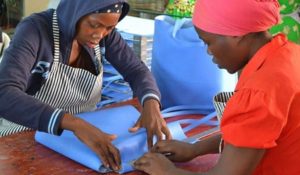
Two women crafting a purse
Taryn is a social intrapreneur, part of a team with Kate Spade that created on purpose, a new line of handbags and accessories manufactured by a for-profit social enterprise in Masoro, Rwanda. The supplier is Rwandan women-owned, and represents an innovative way for a fashion company to empower women and benefit their communities while also having greater oversight over their supply chain.
Georgetown Institute for Women, Peace and Security just released a study that evaluates the impact of the initiative Taryn helped create on the lives of its female employees in Rwanda, and on the viability of this approach as a business model for Kate Spade.
Erin’s SE practicum project has turned into a fulltime entrepreneurial venture about conscious fashion. Called wearwell, Erin and her partner Emily Kenney have launched an online-based personal shopping service to help consumers fit their style with their values. Watch Erin and Emily talk about how individual fashion choices canhelp change the world.![]()
Both ventures help consumers become aware of who is actually making their apparel, and provide shoppers with alternatives to the opaque sweatshop-plagued supply chains endemic in much of the fashion industry.
A record number (35+) of SE students, alumni, faculty, and SIS Social Innovation Fellows attended this spring’s conference. A highlight of the program was an invited session put on by 4 SE alumni.
record number (35+) of SE students, alumni, faculty, and SIS Social Innovation Fellows attended this spring’s conference. A highlight of the program was an invited session put on by 4 SE alumni.
DESIGNING SOCIAL ENTERPRISES FOR SYSTEMIC CHANGE
In this interactive session, Strategic Good invites participants to examine the broader objectives of the social enterprise movement and discuss which social enterprise models have the potential to bring about radical and systemic change. Participants will be challenged to ask how social enterprise models with lower disruptive potential could learn from other models to increase their ability to address the multifaceted systemic challenges faced by society today. The workshop will include ideation, interactive tools, and discussion.
Speakers: Nick Boedicker, Alessandra Clará, Andreas Vailakis, Michael Cobb
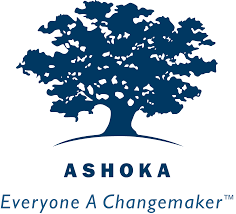 The SE Program continued its relationship with Ashoka, the world’s leading organization promoting social entrepreneurship. At the request of Diana Wells, Ashoka’s President, our first year Context and Best Practices class compared and contrasted the approaches to systems change taken by Ashoka Fellows working on issues related to each student’s professional interests.
The SE Program continued its relationship with Ashoka, the world’s leading organization promoting social entrepreneurship. At the request of Diana Wells, Ashoka’s President, our first year Context and Best Practices class compared and contrasted the approaches to systems change taken by Ashoka Fellows working on issues related to each student’s professional interests.
Also during the past year, Rachel Fauber (Cohort 4) started in a full-time position at Ashoka Changemakers, and Maribel Rodriguez (Cohort 6) was selected for a summer internship at Ashoka’s Start Empathy Initiative.
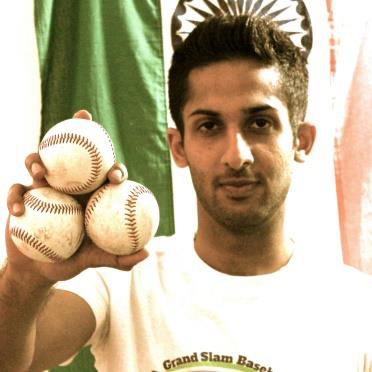
Picture of Gurmat Sahni SIS/MA ’17 – “I’m promoting not only a sport, but also character-building values.
Gurmat Sahani
Gurmat Sahani was unanimously selected to receive the SIS School-Wide Award for “Notable Professional, Policy or Practical Contribution.” Sahani was also featured in a spotlight on the American University Magazine and on the SIS website:
Reimagining Rules of the Game
“There’s a lot of socioeconomic disparity in India. I want to bring kids there together and teach teamwork through my nonprofit Grand Slam Baseball, a national umbrella for everything baseball and softball in India. As a social enterprise student, I’ve learned that business and sports share the same values: to cooperate as a community and set goals and rules to abide by to play, and then to compete. ”
Two other graduating students won SE Program Awards for Notable Professional Contribution (Deborah Agustoni) and Notable Service (Bryant Sewell).
Kogod Business School holds an annual competition for its Big Idea Pitch Award. This year 6 students won awards; 4 were from SE: Caroline Englund, Rina Fetahaj, Chrissy McCurdy, and Rebecca Villalobos.
SIS provided travel grants for Deborah Agustoni and Rebecca Villalobos to pursue their research in Cambodia and Myanmar. For the first time a Plunge client, HIAS, funded travel to North Carolina for Rina Fetahaj and Chrissy McCurdy to interview refugees as part of their consulting project.
Annea Hapciu created a video about the Norwood childcare worker-owned co-op that its organizer credited with gaining the attention of a local foundation which then provided a $25,000 planning grant. Another of Annea’s creative endeavors, Yoga in Albanian Lands, was chosen to be shown at the university’s first Annual Graduate Student Showcase. See her work here.
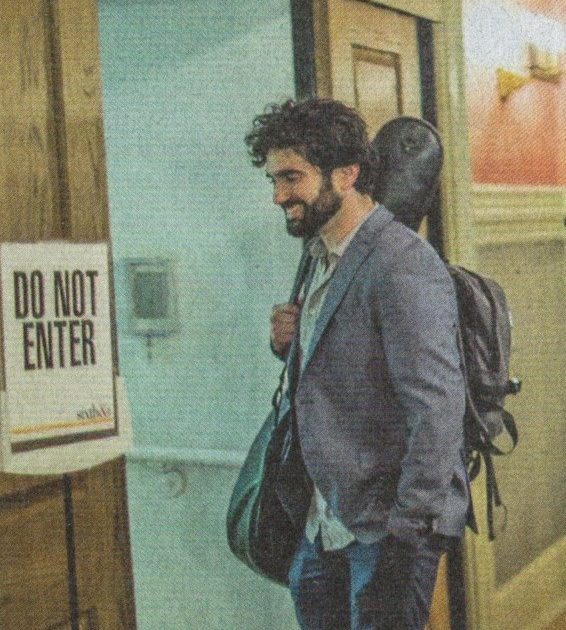
A Washington Post photographer caught Aaron behaving in the rule-bending way characteristic of many in the social enterprise field.
A key to Peace: How a social entrepreneur bridged a violent divide through music
Social Enterprise graduate Aaron Shneyer MA ’14, uses music as a tool for social change. His nonprofit, Heartbeat, brings together high-school musicians from Israel and Palestine to compose music, learn about each other, and reshape the otherwise divided world around them.
Aaron founded Heartbeat in 2007, and has since developed the organization into a global network.
“The youth we work with grew up in a very divided society with no opportunities to interact,” Aaron says. “Through Heartbeat, these youth form relationships based on equality – a sharp contrast to the inequality that exists outside our programs.”
The Power of Music – and Sustaining Change
Heartbeat began as a project under a Fulbright-mtvU fellowship. Aaron proposed going to Jerusalem to create a band with Israeli and Palestinian youth. He studied how music could build mutual understanding, particularly in violent societies.
“These kids lived within ten minutes of each other, but they’d never met. I wanted to do something to start to change that.”
However, after the first year, Heartbeat became a side project for Aaron, mostly due to financing. He experimented with different formats and partnerships, but by 2011, he had realized two things: 1) in order to have the impact he wanted, Heartbeat would need more sustained, regular programs, and 2) that he would need more funding.
“Music has this ability to build awareness among people, but it’s expensive to bring together enough people to reach a critical mass,” Aaron says. “If Heartbeat was going to last, I needed to develop my skills as a social entrepreneur and bring knowledge from the business and nonprofit worlds.”
Aaron decided to continue his education, and in 2012, he enrolled in Social Enterprise at SIS to drive his business toward financial stability.
Why SIS?
“SIS isn’t a political science school – it’s dedicated to service, and that resonated with me. I also liked that the master’s degree offered the chance to go deep on social enterprise; it wasn’t just a side segment within an MBA.”
Another critical piece for Aaron was that he was able to keep managing Heartbeat. He used the program as an incubator, taking Heartbeat through all of the case studies, business plans and social marketing.
“I learned financial literacy and how to align toward strategic goals. While in the program, I took our budget from $25K to $250K. It truly transformed my organization.”
Music and Dialogue
Today, Heartbeat has two chapters plus a graduate program, an audio/video production program, and an international presence through camps, overseas exchanges, and tours. Heartbeat musicians have reached over 15,000 people through live performances and millions through media.
Through its weekly meetings and retreats, Heartbeat fosters musical creation, but also creates the structures for facilitated – and difficult – discussions. Aaron trusts in music to lead to this process.
“We’ve honed in on creating a balance between the music side and the dialogue side and the dialogue side. Our students are united in their passion and always keep that at the center of their experience.”
Their musical connections necessitate mutual respect. With this, students can overcome the present day realities that tear many groups apart.
“Not only do musicians discover their own voice, they also become aware of each other and develop a responsibility to use their music to change things.”
Last fall our Strategic Good alumni (Nick Boedicker, Cohort 2, and Alessandra Clará, Michael Cobb, and Andreas Vailakis – all Cohort 3) put on a well-received “Think Like a Startup” workshop attended by 50 people at Impact Hub DC. Strategic Good also assisted the Design Thinkers Academy with a 5-day intensive design thinking bootcamp, also at Impact Hub. Both events were done in partnership with the SE Program. All this happened in addition to their workshop at the Harvard SE Conference.
Kate Burke (Cohort 1) Gibbs has joined the SE faculty as an adjunct professor teaching a popular, sold-out Spring Skills Institute on resilience. This weekend course builds on her professional work since graduation which she now has an opportunity to share with current SIS students. Congratulations to Kate on her recent marriage!
Magali Caceres (Cohort 5) was joined by her father (an Inter-American Development Bank director) in a speech she made last year in the UN General Assembly Hall. Among other things, Maga speaks about love, long-distance relationships, and the power of youth. Watch it here.
Katrina Calixte (Cohort 4) is Vice President of Business Development at Youii, the first subscription base ride sharing app designed just for university students. The service provides unlimited rides to students anywhere within 5 miles of their campus.
Marc Carr (Cohort 3) is the Events Manager at Impact Hub DC, a co-working space for social and environmental justice-oriented activists in Gallery Place. Several ventures founded by SE graduates such as Heartbeat and Strategic Good are based there.
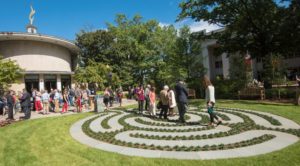
Image of American University Labyrinth
SE co-founder, Professor Joseph Eldridge, is keeping busy off-campus as well as with our program during his “so-called” retirement. He’s been appointed a Senior Fellow at Washington Office on Latin America, which comes with an office in Dupont Circle. Joe is also on several boards, including United States Institute for Peace, the Center for International Policy, the International Labor Rights Forum, Santiago College (in Chile), and the Arca Foundation. When he needs some meditative rest from all this, he can join AU students walking the University Labyrinth, recently installed in front of the Kay Spiritual Life Center, which Joe led for 19 years. The labyrinth has been dedicated in Joe’s honor.
Adrienne Gifford (Cohort 2) has moved to Fresno CA to work as the Sustainability Manager at the global food ingredients company Olam SVI. She started this job shortly after returning from evaluating an agriculture project in Zambia. Adrienne sharpened her agribusiness interests during her 2014 practicum project with the Uganda Community Farm, a for-profit community-managed organic vegetable farm.
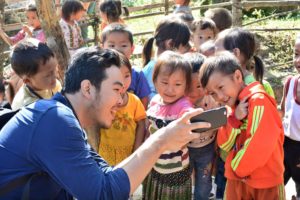
Khavi showing students a video
Khavi Homsombath (Cohort 4) has been serving as head of program at Aide et Action in Laos. This work has involved him traveling all over the country, working in partnership with the Ministry of Education and Sports to ensure all children have access to quality education regardless of their gender or socio-economic status. Khavi is making use of the human centered design principles he learned in the SE Program and brought to Laos in his capstone practicum project.
Eagle Hill Consulting has now attracted 3 SE alums. Jeremy Jensen (Cohort 2) serves as a Manager there, Sarah Oakes (Cohort 5) an Associate Consultant. Both have been recently joined by Kateland Oakes (Cohort 4), who has left her position as Assistant Director, Content Strategy at the Christian Science Monitor for the consulting world.
Practitioner Affiliate Monisha Kapila has received a $2.1 Million dollar grant from the Bill and Melinda Gates Foundation to fund a new Fellowship in Digital Finance. This will allow experienced fintech and financial inclusion professions to spend a year working in these areas in the US government.
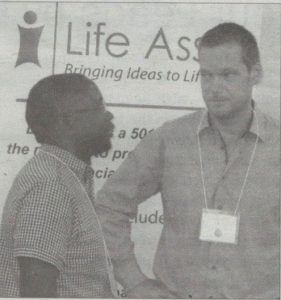
John Kavyavu at Life Asset
Zack Kaufman, a Practitioner Affiliate, has taken a leave of absence from teaching at Harvard to serve as a Council on Foreign Relations International Affairs Fellow. This brings him back to DC where he is working on the minority staff of the Senate Foreign Relations Committee.
John Kavyavu (Cohort 2) is a senior loan officer at Life Asset. They provide micro-loans, training, and a business incubator to help alleviate poverty in Washington, DC. John also is director of Pro-Microfinance International and founder of the Congolese Diaspora Mutual Funds.
Amanda Lotz (Cohort 2) is part of a small team of intrapreneurs doing research and product creation to help LendUp increase its positive impact on its customers. When not serving as a Social Impact Associate, she enjoys hiking and camping around the Bay Area.
Kristen Moses (Cohort 1) is working at US Citizenship and Immigration Services.
Kerry Murphy (Cohort 1) is director of Certification and Innovation at WEConnect International.
Huong Nguyen (Cohort 4), after a post-graduate year working with Vietnamese immigrants in the DC area, is returning to Hanoi. She’s eager to bring concepts such as “business model canvas” and “small wins” to the vibrant start-up community there. After graduation from the SE Masters, Huong was a grant writer for Vietnamese American Services, Inc.
Colin Rice (Cohort 4) is off to Limpopo Province in South Africa. 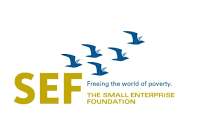 There he’ll work with The Small Enterprise Foundation, an organization founded by an Ashoka Fellow andmodeled after the Grameen Bank of Bangladesh, which uses microfinance to work toward eliminating poverty and unemployment.
There he’ll work with The Small Enterprise Foundation, an organization founded by an Ashoka Fellow andmodeled after the Grameen Bank of Bangladesh, which uses microfinance to work toward eliminating poverty and unemployment.
Community Wealth Partners, one of the leading social enterprise management consulting firms, has hired Steven Rodriguez (Cohort 4) as an Associate in its consulting staff. See how they’ve profiled Steven here.
As soon as the Spring Semester wrapped up, Professor Nancy Sachs flew to Australia to put on a workshop on Social Enterprise and Design Thinking at that country’s leading school, Australian National University in Canberra.
Mike Sayre (Cohort 1) has relocated to Cambodia where he is doing a developmental evaluation of a collective impact initiative called Family Care First. He is doing this as part of an Institutional Learning Team put together by Search for Common Ground.
Sara Seavey (Cohort 1) has moved from FHI 360 to Mennonite Economic Development Associates (MEDA). At MEDA she is a Senior Program Manager and Gender Advisor to 7 development projects working on women’s economic empowerment, which was also the subject of Sara’s capstone practicum project. After graduation, her classmate Trey Waters (Cohort 2) also worked at MEDA. He’s now a Program Director at Mercy Corps in Uganda.

Aaron and his family
Aaron Shneyer (Cohort 2) has been busy growing both his social enterprise Heartbeat and his family. Late last fall his second son, Lev Benjamin Paz, was born, weighing in at 8.1 lbs.
Sara Stromer (Cohort 2) is a Senior Associate for International Grants and Contracts at the American Red Cross HQ.
When not teaching SE students crowdfunding, Professor Krista Tuomi provides pro bono financial boot camps, workshops, and consultations to budding entrepreneurs needing help getting their businesses off the ground. She does this through local incubators and a volunteer arm of the US Small Business Administration. Krista’s efforts have been throughout the US, often focusing on states such as Michigan that are looking for entrepreneurship to take the place once occupied by troubled auto and chemical companies.
Earlier this year Stevie Smyth Valdez (Cohort 1) left DC and the UN Foundation for Mexico City to become the Chief Operations Officer at SVX Mexico. The organization’s purpose is to ensure capital serves humanity by growing the volume of impact investmen ts in Mexico. Check them, and Stevie, out here.
Practitioner Affiliate Vivian Vasallo has been appointed Managing Director of the Center for the Future of Aging at the Milken Institute in Santa Monica CA. Vivian believes the future of aging will be different and is looking forward to challenging the conventional wisdom through research and education. This new role will extend the work she had done as Vice President at AARP Foundation.
Back from several years immersed in India’s social enterprise ecosystem, Pomai Verzon (Cohort 2) moved to Manhattan and started work as a Program Associate for Strategic Initiatives at 100Kin10, an organization that’s building a network to ensure US classrooms have 100,000 STEM teachers by 2021.
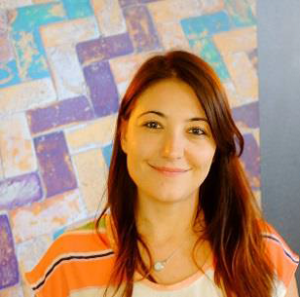
Deborah Agustoni
Deborah joined the Social Enterprise master’s program with a passion to help empower individuals affected by human trafficking. For her practicum, she traveled to Cambodia to conduct a needs assessment with trafficking survivors and at-risk youth to understand their needs, skill sets, and aspirations. To address their economic needs, Deborah created a business model for FreeLux, an all-natural conscious skin care company that would employ those affected by human trafficking in supply chain cooperatives. After graduation, Deborah plans to start fundraising for FreeLux.
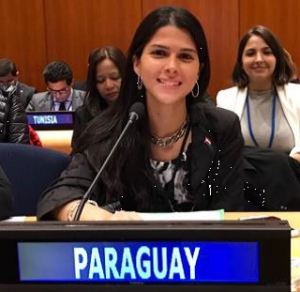
Magali Cacares
Paraguay is experiencing an extraordinary development opportunity with over 60% of its population younger than 35 years old. This historic moment provides an enormous opportunity to innovate. The purpose of Maga’s practicum on “Innovation and Youth Public Policies in Paraguay: Best Practices and Recommendations” is to deliver a proposal to the Government of Paraguay, specifically the Ministry of Youth, that analyzes the main challenges of Paraguay’s youth and provides concise recommendations for youth public policies and interventions based on best practices in the region.
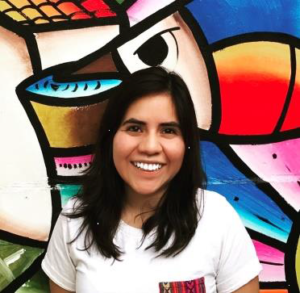
Juny Canenguez
Juny focused her practicum on economically empowering artisans in El Salvador. She spent two weeks in El Salvador conducting a needs assessment, where she interviewed and observed artisans from various sectors. She found that one of their main needs is related to marketing. Therefore, she created a blog that showcases artisans and their work. Juny realized that she can help artisans by telling their stories to new audiences, as investing in artisan businesses creates jobs, increases local incomes, and preserves ancient cultural traditions that in many places, such as El Salvador, are at risk of being lost.
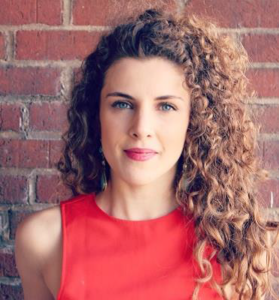
Annea Hapçiu
A KAEF fellow from Kosovo, Annea worked during her graduate studies to further develop the all-girls educational and professional bureau, Global Girl Media, that she established two years ago. For her practicum project, she created a social business plan and social impact model for the first yoga studio in Kosovo—n’Yoga. She established n’Yoga in 2013, with the goal of helping people deal with the war trauma and difficult post-war environment created in the country. By helping to highlight yoga locally through her project “Yoga in Albanian Lands,” Annea hopes to attract foreign travelers to her country to learn more about Albanian culture. She is currently working on a crowdfunding campaign to raise funds to help renovate new space for n’Yoga.
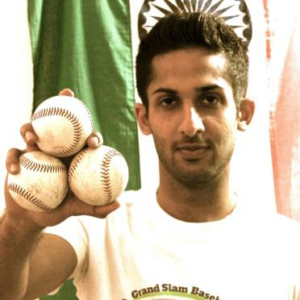
Raunaq Sahni
At age 20, Raunaq co-founded Grand Slam Baseball with his childhood best friend and continued the organization’s development while at AU. Grand Slam Baseball is the umbrella organization for all baseball and softball programs in India. The organization launched India’s first professional-size baseball and softball stadium in collaboration with Major League Baseball in January 2017. Raunaq was invited to give a presentation about Grand Slam Baseball’s social impact at the World Bank headquarters in DC. He is now planning his second venture, a dairy cooperative project that aims to help 200 Indian villagers currently living in extreme poverty.
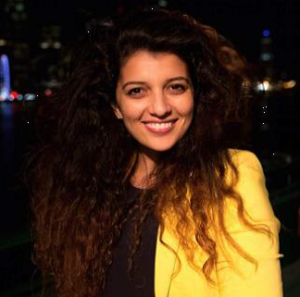
Saloua Lahlou
As a global language, English fluency has become a highly marketable skill. In many parts of the world, English language education remains an opportunity available only to the privileged, leaving many youth without the ability to gain the necessary skills to improve their lives. For her practicum, Saloua launched Crafting Love and Hope, a new youth empowerment initiative to provide a combination of technology and language education to youth residing in the Sanabil Al Khair orphanage in Ain Atiq, Morocco. The organization provided electronic tablets and teaching faculty to classrooms to expedite and enhance the learning process, making it both enjoyable and sustainable.
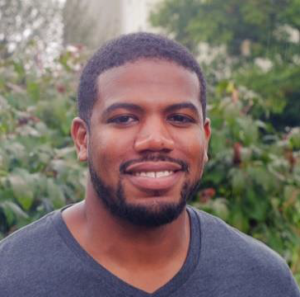
Bryant Sewell
Bryant Sewell’s practicum focused on a business solution that helps employers with talent needs “hire in” for potential rather than exclude individuals for a perceived lack of experience or education. The beneficiary of this solution is not just the employer; it is also the millions of economically disadvantaged young adults who build their human capital through non-traditional routes. Bryant’s research and interviews culminated in a hiring platform that allows these young adults to present their interests, experiences, competencies, and character qualities to employers. Hiring managers now can search beyond a resume to find a good fit for a job and their organization.
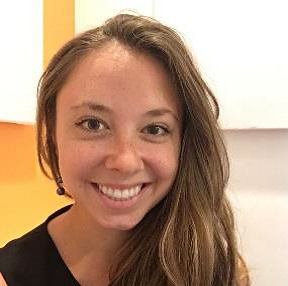
Sarah Oakes
Sarah worked with Eagle Hill—a small, woman-owned consulting business that focuses on strategy, organizational design, and change management. She developed a Corporate Social Responsibility (CSR) strategy to help employees develop skills, support local nonprofits, and create social impact in the DC community. Sarah conducted a needs assessment with input from employees and senior leadership, local nonprofits, and private sector organizations to identify best practices and strategic opportunities for Eagle Hill. Sarah developed a strategic plan that included employee volunteer opportunities, a pro-bono consulting program, and a philanthropic giving strategy.
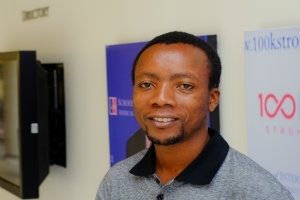
Louis Sichali
Louis is a Fulbright scholar from Malawi, completing his master’s degree in Social Enterprise with a concentration in entrepreneurship and development. Back in Malawi, Louis worked as a vocational school teacher. For his practicum at AU, he developed a training guide and PowerPoint presentation on entrepreneurship and innovation to provide workshops in Malawi for vocational school trainers who then can teach students about innovation and entrepreneurship. Louis believes that imparting innovative entrepreneurial knowledge to Malawi youth is key to reducing youth unemployment.
This spring two former senior White House officials joined American University. Sylvia Burwell, formerly Secretary of Health and Human Services and Director of the Office of Management and Budget, was named AU’s new President. She previously led the Walmart Foundation and was COO at the Gates Foundation. Susan Rice, President Obama’s National Security Advisor and US Ambassador to the United Nations has joined the School of International Service as Distinguished Visiting Research Fellow.
The SE Program also took advantage of the transition in administrations by inviting the Senior Policy Advisor in the Obama White House Office of Social Innovation, Laura Tomasko, to speak at 1776 to 35 SE students, alumni, and faculty about the role of the White House in promoting social entrepreneurship and evidence-based funding.
For more information about the American University Social Enterprise Program, visit the website or contact Robert Tomasko, the Program Director at tomasko@american.edu.
